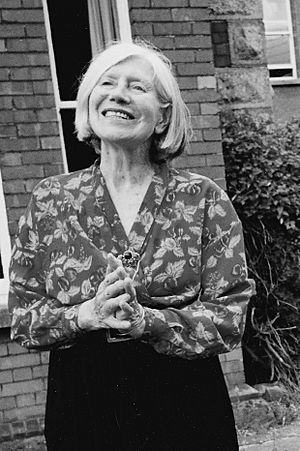Eithne Strong facts for kids
Quick facts for kids
Eithne Strong
|
|
|---|---|
 |
|
| Born | 1923 Limerick, Ireland |
| Died | 1999 Monkstown, County Dublin |
| Pen name | Eithne Strong |
| Occupation | Poet, writer |
| Nationality | Irish |
Eithne Strong (born O'Connell, 1923–1999) was an important Irish poet and writer. She was special because she wrote in two languages: both Irish and English. Her very first poems in Irish were printed in magazines like Combhar and An Glor around 1943-1944. She was also one of the people who started Runa Press. This publishing company was known for its early books, which sometimes featured art by famous Irish artists like Jack B. Yeats. Runa Press also published a book called Marrowbone Lane in 1943, which told the story of the fierce fighting during the Easter Rising in 1916.
Contents
About Eithne Strong's Life
Her Early Years in Limerick
Eithne Strong was born in a place called Glensharrold in County Limerick, Ireland. Her parents, John and Kathleen O'Connell, were both school teachers. She went to an Irish-speaking school named Coláiste Muire in Ennis.
Moving to Dublin and Family Life
Later, Eithne moved to Dublin. At that time, she couldn't afford to go to college, so she worked for the government for a year. While in Dublin, she met Rupert Strong, who was a psychoanalyst. They got married on November 12, 1943. Eithne and Rupert had nine children together. One of their children needed special care because of a mental health condition.
Education and Writing Career
When Eithne was in her forties, she went to Trinity College Dublin and earned a degree in 1973. Many famous writers and thinkers, like Robert Graves and Brendan Kennelly, admired her poetry and encouraged her work.
Eithne Strong was very active in the literary world. She worked in publishing, wrote for newspapers and magazines, and taught creative writing. She also traveled to many countries, including Denmark, France, Germany, and the USA, to represent Irish writing. Her poems and short stories were published in many magazines and books both in Ireland and other countries. For example, she read her poems in New York City and Washington, D.C. in 1994.
Her Unique Style of Writing
Mary O'Donnell, who is also a writer, once wrote about Eithne Strong's poems. She said that Eithne's poems showed a wide range of ideas and feelings. She believed that these poems truly showed "humanity, belief and a strong sense of justice." Another editor, Christine Elizabeth Murray, compared Eithne Strong's poetry to that of other famous Irish poets. She said their work provided an "amazing root-system" for new writers, connecting them to their land and language.
Awards and Legacy
In 1991, Eithne Strong won the Kilkenny Design Award for her book Flesh – The Greatest Sin. She was also a member of Aosdána, which is an Irish organization that honors artists. Eithne Strong passed away in Monkstown, Dublin, in 1999.
Today, there is a special award named after her and her husband, Rupert. It's called the Strong/Shine Award and is given out at the Dún Laoghaire Annual Book Festival. This award celebrates poetry and is supported by Shine, an organization that helps people affected by mental ill health.
On International Women's Day in 2000, an event was held to remember Eithne Strong's life and work at the Irish Writer's Centre in Parnell Square, Dublin. In 2012, a room at the centre was named in her honor. Her original writings and papers are kept at the National Library of Ireland.

